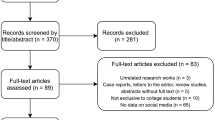Abstract
The present study describes the development of a new scale to measure Beliefs toward Mental Illness (BMI), which was designed to measure cross-cultural differences in such beliefs as well as to predict treatment-seeking behavior among different cultural groups. A total of 216 students participated in this study (114 Asian students and 102 American students). A series of factor analyses examining construct validity for the BMI revealed that the BMI has three dimensions, including dangerousness, poor social and interpersonal skills, and incurability. Examination of the reliability estimates for each factor revealed moderate to high internal consistency of the BMI. Comparisons between American and Asian students revealed the expected cultural differences in their beliefs toward mental illness and treatment preference.
Similar content being viewed by others
REFERENCES
Atkinson, D. R., Lowe, S., & Matthews, L. (1995). Asian-American acculturation, gender, and willingness to seek counseling. Journal of Multicultural Counseling and Development, 23(3), 130-138.
Chou, K. L., & Mak, K. Y. (1998). Attitudes to mental patients among Hong Kong Chinese: A trend study over two years. International Journal of Social Psychiatry, 44(3), 215-224.
Chou, K. L., Mak, K. Y., Chung, P. K., & Ho, K. (1996). Attitudes towards mental patients in Hong Kong. International Journal of Social Psychiatry, 42(3), 231-219.
Enrique, G. A. Jr. (1993). Psychiatric care of Filipino Americans. In Gaw, A. C (Ed.) Culture, ethnicity, and mental illness. Washington, DC: American Psychiatry Press, Inc.
Fabrega, H. Jr. (1991). Psychiatric stigma in non-Western societies. Comprehensive Psychiatry, 32, 534-551.
Fan, C. (1999). A comparison of attitudes towards mental illness and knowledge of mental health services between Australian and Asian students. Community Mental Health Journal, 35(1), 47-56.
Fujii, J. S., Fukushima, S. N., & Yamamoto, J. (1993). Psychiatric care of Japanese Americans. In Gaw, A. C (Ed.) Culture, ethnicity, and mental illness. Washington, DC: American Psychiatry Press, Inc.
Gaw, A. C. (1993). Psychiatric care of Chinese Americans. In Gaw, A. C (Ed.) Culture, ethnicity, and mental illness. Washington, DC: American Psychiatry Press, Inc.
Hatfield, B., Mohamad, H., Rahim, Z., & Tanweer, H. (1996). Mental health and the Asian Communities: A local survey. British Journal of Social Work, 26, 315-336.
Johnson, S., & Orrell, M. (1995). Insight and psychosis: a social perspective. Psychological Medicine, 25, 515-520.
Kim, L. I. C. (1993). Psychiatric care of Korean Americans. In Gaw, A. C (Ed.), Culture, ethnicity, and mental illness. Washington, DC: American Psychiatry Press, Inc.
Lam, A. P., & Kavanagh, D. J. (1996). Help seeking by immigrant Indochinese psychiatric patients in Sydney, Australia. Psychiatric Services, 47(9), 993-995.
Leong, F. T. L., Wagner, N. S., & Kim, H. H. (1995). Group counseling exceptions among Asian American students: the role of culture-specific factors. Journal of Counseling Psychology, 42(2), 217-222.
Matsuoka, J. K., Breaux, C., & Ryujin, D. H. (1997). National utilization of mental health services by Asian Americans/Pacific Islanders. Journal of Community Psychology, 25(2), 141-145.
Ng, C. H. (1997). The stigma of mental illness in the Asian cultures. Australian and New Zealand Journal of Psychiatry, 31, 382-390.
Raguram, R., Weiss, M. G., Channabasavanna, S. M., & Devins, G. M. (1996). Stigma, depression and somatization in South India. American Journal of Psychiatry, 153, 1043-1049.
Suinn, R. M., Ahuna, C., & Khoo, G. (1992). The Suinn-Lew Asian Self-Identity Acculturation Scale: concurrent and factorial validation. Educational and Psychological Measurement, 52, 1042-1046.
Suinn, R. M., Figueroa, K. R., Lew, S., & Vigal, P. (1987). The Suinn-Lew Asian Self-Identity Acculturation Scale: an initial report. Educational and Psychological Measurement, 47, 401-407.
Whaley, A. L. (1997). Ethnic and racial differences in perceptions of dangerousness of persons with mental illness. Psychiatric Services, 48(10), 1328-1330.
Wintersteen, R. T., Wintersteen, L. B., Mupedziswa, R., & Cheah, A. (1997). Families and mental illness: Observations from two developing countries. International Social Work, 40(2), 191-207.
Zhang, A. Y., Snowden, L. R., & Sue, S. (1998). Differences between Asian and white Americans' help seeking and utilization patterns in the Los Angeles Area. Journal of Community Psychology, 26(4), 317-326.
Author information
Authors and Affiliations
Rights and permissions
About this article
Cite this article
Hirai, M., Clum, G.A. Development, Reliability, and Validity of the Beliefs Toward Mental Illness Scale. Journal of Psychopathology and Behavioral Assessment 22, 221–236 (2000). https://doi.org/10.1023/A:1007548432472
Issue Date:
DOI: https://doi.org/10.1023/A:1007548432472




